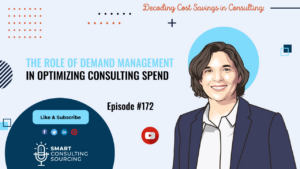Hello and welcome to episode 64 of our podcast: Smart Consulting Sourcing, THE podcast about Consulting Procurement.
My name is Hélène, and I’ll be your host today.
Each week I’ll give you the keys to better use, manage and source consulting services.
In this week’s episode, I’ll tell you how to lead a make or buy analysis for a consulting project
Last week, I discussed whether you always need worldwide consultants for global projects.
We learned that procuring consulting services is not rocket science. But it’s not easy either. Unfortunately, I find that many buyers are unaware of the complexity of buying consulting services. That is why they often choose to work with big global consultancies instead of taking the time to find a good fit for their projects. And this can lead to major issues down the line.
If you need consulting services, determining how to find consultants can be a complicated task. Selecting which consultants to work with based on their quality, approach, responsiveness, and costs is not always easy.
In addition, consultants’ geographical location or cultural fit could push your final decision one way or another. However, before the hiring process starts, you can find the perfect consultant for your project through thorough research.
You should always check if you have some Internal resources available when you start a project. Because it frequently entails keeping expenditures low and making the most of your internal talents and assets.
However, this may rapidly run out of steam if the project team isn’t granted adequate time and responsibilities to manage the project successfully.
Furthermore, because internal project leaders are frequently high-potentials on the fast track to senior leadership, they find it difficult to challenge boundaries and confront more established leaders and influencers who have the power to determine their success.
I mean, would you dare to tell the ugly truth to a member of the C-suite as a young professional? Probably not.
However, assigning an independent team can bring focus, speed, and pressure to the table in some circumstances, which is usually enough for a project’s success.
Why should you lead a make or buy analysis for a consulting project?
Most companies and their procurement function work to optimize their external spend and their pool of suppliers to better support the overall strategy.
As a result, they have developed methods for answering a variety of complicated questions:
- What are the key activities that can be outsourced?
- What does the pool of potential suppliers look like?
- How mature is the market for suppliers?
- What providers are appropriate for us?
- Is it worth it to outsource a particular activity for the long term?
The same questions apply to Consulting Procurement. Unfortunately, most companies have neither the experience nor the methods to answer them.
Yet, today, all leaders throughout an organization, from the head of procurement to senior executives responsible for signing off on major consulting projects, are expected to align their activities with the enterprise’s overall strategy.
But when it comes to making decisions about consultants, they fall back on word of mouth, on perceptions of the reputations of various providers, and on the sometimes-outsized claims of the consultants themselves.
Or they take the line of least resistance and simply hire the consultants they have used in the past, regardless of whether those consultants are the most appropriate for a particular project or for furthering the company’s broader strategy.
These leaders have no reliable way to determine whether a particular consultant precisely meets the company’s needs, no way to gauge a consultant’s likely level of performance, and no benchmarks against which to compare providers.
And until they avail themselves of an independent, credible means of assessing providers and matching them to their company’s needs, they are likely to lag their competitors who have.
But let’s go back to the start. When you look at a project, there are two things that you should check before hiring a consultant. First, is it possible to externalize this project? And second, does it create value?
Let’s have a look at the “Externaliz-ability” of your project
Can we externalize this project?
Best procurement practices recommend having a well-defined project that can be handled independently (as much as possible) from the rest of the organization.
For Consulting projects, these best practices translate into the ability to function in project mode with a focused team.
- Are you able to define clear deliverables for your project?
You need to describe the results or outcomes you expect from the project. It can be a document (report, presentation) or a meeting (workflow, seminar).
- Can you define a firm deadline for the project?
Your project has to be clearly limited in time. Interestingly enough, the ability to define a firm deadline is closely related to your project’s priority level. The higher the priority, the firmer the deadline.
- What is the level of uncertainty of your project?
Another critical point is the level of uncertainty. For example, suppose your project has a lot of interdependencies with other internal activities. In that case, it can soon become impossible to deliver on quality and time if any other party involved does not deliver on quality and time.
Therefore, you need your project to be as independent as possible from other parts of the organization.
- Do you have access to the necessary resources?
Tricky question. The idea here is to assess if the resources you need for your project are accessible internally or externally. Or in other words, are there individuals in your company or in external consulting firms able to deliver on your project?
Is there value in externalizing this project?
Once you have validated that your project was a good candidate for external consultants, you can evaluate the externalization value or the value created through outsourcing the project.
- Are the skills involved in the project core for your company?
When you have the right skills and resources available internally, doing the project in-house might make more sense. If that is not the case, but the skills are or will soon be core to your company, you might want to beef up your existing teams and launch the project internally.
Will we need this skill for other projects in the next three years? Using external resources to build the foundation of a new competency, and start up-skilling your teams, can be a brilliant move.
- Is there a specific reason to go external?
You might want to take advantage of independent expertise, get third-party validation for your management decisions, or .leverage a consultant’s brand to justify painful decisions. In all these cases, working with external consultants will be a key success factor for your project.
- Do we improve the business case if we accelerate the project?
Outsourcing a project should bring more value than doing it in-house. If boosting the project (compared to the time it would take internally) adds value, you want to work with consultants.
- Do we have the necessary skills and resources to supervise the project?
You will need to find a project manager who understands the project’s scope and the Consulting Firm’s work. And you will need to free some of his team to supervise the project properly.
- Are there companies that can provide that service?
This is another tricky question. The consulting market is very rich and diverse. There are more than 5,000 consulting firms across the globe!
There is a good chance that there is one that provides the service you are looking for. However, if you are looking for a very niche or a hybrid skillset, it might make sense to do a little research.
- Is there sensitive IP or information involved in the project?
You don’t want your IP or your strategy to be out there. Some consultants have specialized in working across the board in one industry and selling their benchmark.
Besides, from a strict risk management standpoint, the more people involved in a project, the riskier to breach confidentiality.
Now you probably have a better idea of the value you get can from outsourcing the project. And you can get to the next step: defining the scope of your project in more detail.
But let me go back to make or buy. Whenever you launch a project, you have to ask yourself if your project is a good candidate for outsourcing to consultants and if it will create more value than leading the project internally.
Make or Buy Decisions are usually closely related to Demand Management. Therefore, putting together a Framework that allows you to make both decisions simultaneously can save you some time and energy.
A very common and visual tool to support decision-making when the criteria are difficult to compare is the Decision Matrix. The role of the Decision-Matrix is to remove the subjectivity and thus facilitate the discussion and the reach of a consensus.
That’s where our episode ends. Next week, I’ll give you 5 Real-Life Lessons About Consulting Sourcing.
In the meantime, if you have any questions, or want to learn more about what we do at consulting quest, just send me an email at helene.laffitte@consultingquest.com
You can also have a look at our website smartconsultingsourcing.com to know more about our book and download free templates & guides to improve your consulting sourcing.
Bye and see you next week! Au revoir!








